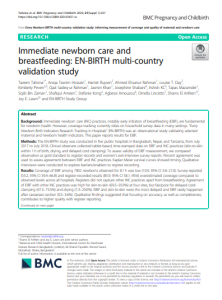
Background:
Immediate newborn care (INC) practices, notably early initiation of breastfeeding (EIBF), are fundamental for newborn health. However, coverage tracking currently relies on household survey data in many settings. “Every Newborn Birth Indicators Research Tracking in Hospitals” (EN-BIRTH) was an observational study validating selected maternal and newborn health indicators. This paper reports results for EIBF.
Methods:
The EN-BIRTH study was conducted in five public hospitals in Bangladesh, Nepal, and Tanzania, from July 2017 to July 2018. Clinical observers collected tablet-based, time-stamped data on EIBF and INC practices (skin-to-skin within 1 h of birth, drying, and delayed cord clamping). To assess validity of EIBF measurement, we compared observation as gold standard to register records and women’s exit-interview survey reports. Percent agreement was used to assess agreement between EIBF and INC practices. Kaplan Meier survival curves showed timing. Qualitative interviews were conducted to explore barriers/enablers to register recording.
Results:
Coverage of EIBF among 7802 newborns observed for ≥1 h was low (10.9, 95% CI 3.8–21.0). Survey-reported (53.2, 95% CI 39.4–66.8) and register-recorded results (85.9, 95% CI 58.1–99.6) overestimated coverage compared to observed levels across all hospitals. Registers did not capture other INC practices apart from breastfeeding. Agreement of EIBF with other INC practices was high for skin-to-skin (69.5–93.9%) at four sites, but fair/poor for delayed cord-clamping (47.3–73.5%) and drying (7.3–29.0%). EIBF and skin-to-skin were the most delayed and EIBF rarely happened after caesarean section (0.5–3.6%). Qualitative findings suggested that focusing on accuracy, as well as completeness, contributes to higher quality with register reporting.